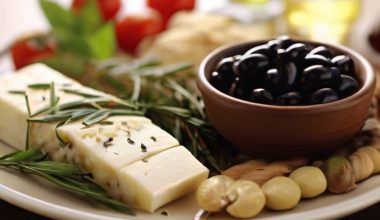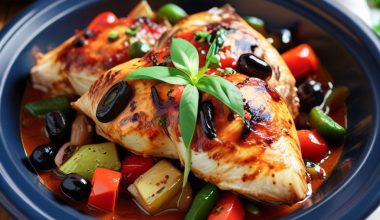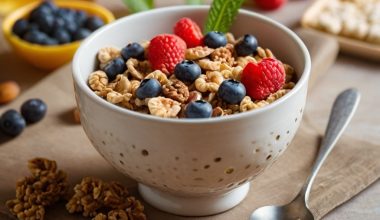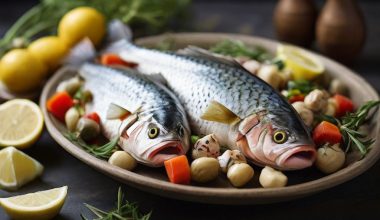Overview of the Mediterranean Diet
The Mediterranean diet is a way of eating based on the traditional cuisine of countries surrounding the Mediterranean Sea, known for its abundance of fruits, vegetables, whole grains, seafood, and olive oil.
Importance Of Healthy Fats
Healthy fats play a significant role in the Mediterranean diet, with monounsaturated and polyunsaturated fats being staples.
Monounsaturated Fats
Olive oil is a primary source of monounsaturated fats in the Mediterranean diet. It can be used in cooking, dressings, and as a finishing drizzle.
Polyunsaturated Fats
Foods rich in omega-3 fatty acids, such as fish, nuts, and seeds, are essential components of the Mediterranean diet for their anti-inflammatory properties.
Recommended Fat Intake
| Age Group | Recommended Fat Intake |
|---|---|
| Adults | Around 35-40% of daily calories from fat, with a focus on healthy fats |
| Children | About 25-35% of daily calories from fat, emphasizing nutrient-dense sources |
Healthy Fat Guidelines
- Choose olive oil, avocados, and nuts as primary fat sources
- Limit saturated fats found in fatty meats and dairy products
- Avoid trans fats, often present in processed and fried foods
Balance is Key
While fats are an integral part of the Mediterranean diet, balance is crucial. It is essential to consider overall calorie intake and portion sizes to maintain a healthy weight.
Consult A Healthcare Provider
If you have specific dietary concerns or health conditions, consult a healthcare provider or a registered dietitian to tailor the Mediterranean diet to your individual needs.
Final Thoughts
Ultimately, the Mediterranean diet offers a delicious and nutritious approach to healthy eating, with fats playing a vital role in supporting overall well-being.
Frequently Asked Questions Of How Much Fat Is Eat On A Mediterranean Diet
How Much Fat Is Recommended In A Mediterranean Diet?
It is recommended to include healthy fats in a Mediterranean diet, such as olive oil, nuts, and avocados. Moderation is key, with around 30-35% of total calories from fat.
What Are The Main Sources Of Fat In A Mediterranean Diet?
The main sources of fat in a Mediterranean diet include olive oil, nuts, seeds, fatty fish like salmon, and avocados. These provide beneficial monounsaturated and omega-3 fats.
Can I Eat Dairy Products On A Mediterranean Diet?
Yes, dairy products can be consumed in moderation as part of a Mediterranean diet. Opt for low-fat options like Greek yogurt and feta cheese, which are common in Mediterranean cuisine.
Is It Okay To Consume Saturated Fat On A Mediterranean Diet?
While saturated fat should be limited in a Mediterranean diet, it is not completely eliminated. Sources like red meat and full-fat dairy should be consumed in moderation to maintain a balanced intake.
Discover the secrets of one of the world’s most celebrated diets with our comprehensive guide to the Mediterranean diet’s healthy fats. Rich in flavor and renowned for its numerous health benefits, this eating pattern revolves around wholesome ingredients like fruits, vegetables, whole grains, and, notably, heart-healthy fats. In this article, we delve into the importance of incorporating healthy fats into your diet, with a special focus on monounsaturated and polyunsaturated fats—the cornerstones of Mediterranean cuisine.
From the culinary delights of olive oil to the nutritional wonders of fish and nuts, we explore the main sources of these essential fats and offer practical tips for integrating them into your meals. Join us as we navigate the delicious landscape of the Mediterranean diet, providing expert advice, answering common questions, and empowering you to embrace a healthier lifestyle with every bite.
Whether you’re a seasoned food enthusiast or a health-conscious individual seeking to elevate your nutrition, this guide is your roadmap to savoring the Mediterranean way of life while nurturing your well-being.
Overview of the Mediterranean Diet
The Mediterranean diet is a way of eating based on the traditional cuisine of countries surrounding the Mediterranean Sea, known for its abundance of fruits, vegetables, whole grains, seafood, and olive oil.
Importance Of Healthy Fats
Healthy fats play a significant role in the Mediterranean diet, with monounsaturated and polyunsaturated fats being staples.
Monounsaturated Fats
Olive oil is a primary source of monounsaturated fats in the Mediterranean diet. It can be used in cooking, dressings, and as a finishing drizzle.
Polyunsaturated Fats
Foods rich in omega-3 fatty acids, such as fish, nuts, and seeds, are essential components of the Mediterranean diet for their anti-inflammatory properties.
Recommended Fat Intake
| Age Group | Recommended Fat Intake |
|---|---|
| Adults | Around 35-40% of daily calories from fat, with a focus on healthy fats |
| Children | About 25-35% of daily calories from fat, emphasizing nutrient-dense sources |
Healthy Fat Guidelines
- Choose olive oil, avocados, and nuts as primary fat sources
- Limit saturated fats found in fatty meats and dairy products
- Avoid trans fats, often present in processed and fried foods
Balance is Key
While fats are an integral part of the Mediterranean diet, balance is crucial. It is essential to consider overall calorie intake and portion sizes to maintain a healthy weight.
Consult A Healthcare Provider
If you have specific dietary concerns or health conditions, consult a healthcare provider or a registered dietitian to tailor the Mediterranean diet to your individual needs.
Final Thoughts
Ultimately, the Mediterranean diet offers a delicious and nutritious approach to healthy eating, with fats playing a vital role in supporting overall well-being.
Frequently Asked Questions Of How Much Fat Is Eat On A Mediterranean Diet
How Much Fat Is Recommended In A Mediterranean Diet?
It is recommended to include healthy fats in a Mediterranean diet, such as olive oil, nuts, and avocados. Moderation is key, with around 30-35% of total calories from fat.
What Are The Main Sources Of Fat In A Mediterranean Diet?
The main sources of fat in a Mediterranean diet include olive oil, nuts, seeds, fatty fish like salmon, and avocados. These provide beneficial monounsaturated and omega-3 fats.
Can I Eat Dairy Products On A Mediterranean Diet?
Yes, dairy products can be consumed in moderation as part of a Mediterranean diet. Opt for low-fat options like Greek yogurt and feta cheese, which are common in Mediterranean cuisine.
Is It Okay To Consume Saturated Fat On A Mediterranean Diet?
While saturated fat should be limited in a Mediterranean diet, it is not completely eliminated. Sources like red meat and full-fat dairy should be consumed in moderation to maintain a balanced intake.







